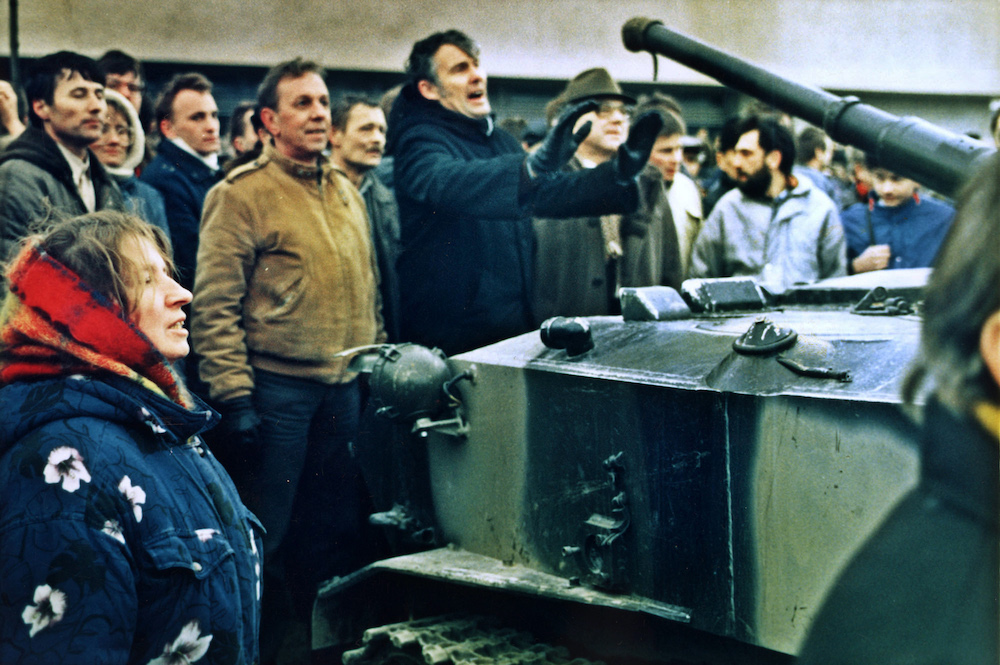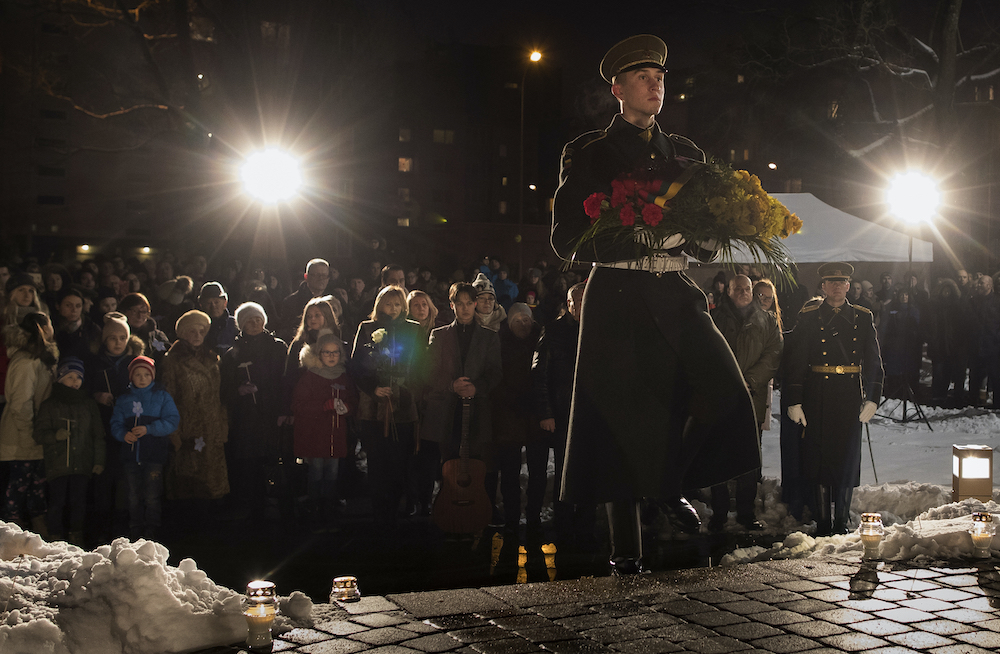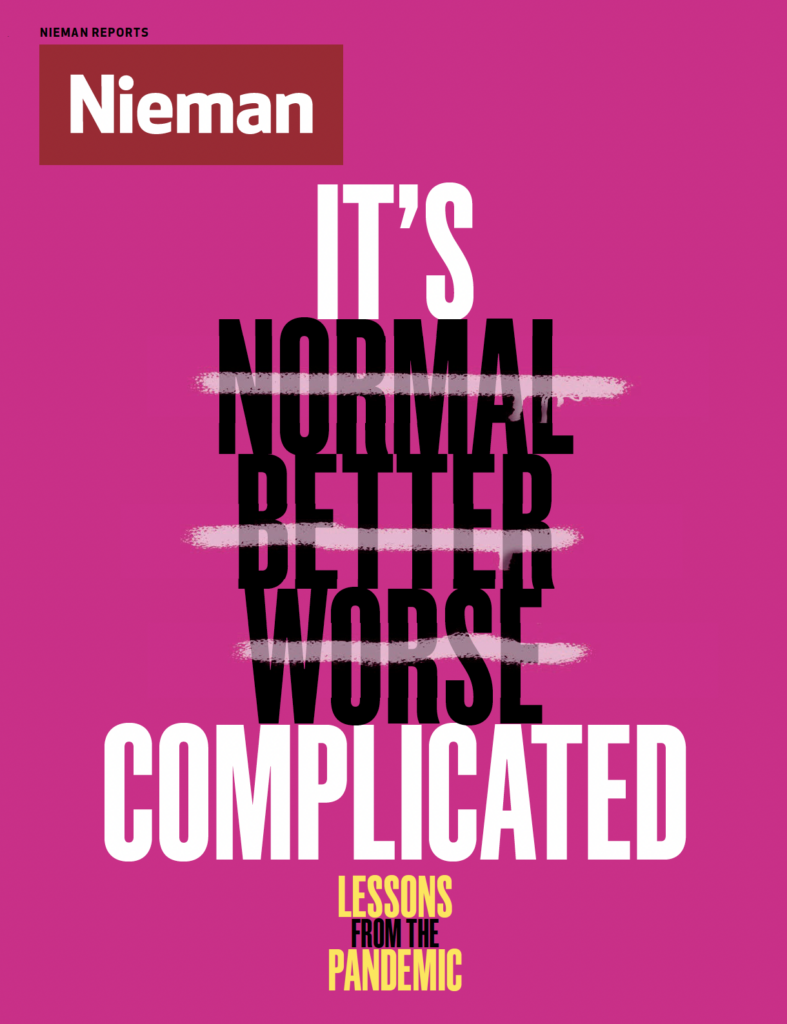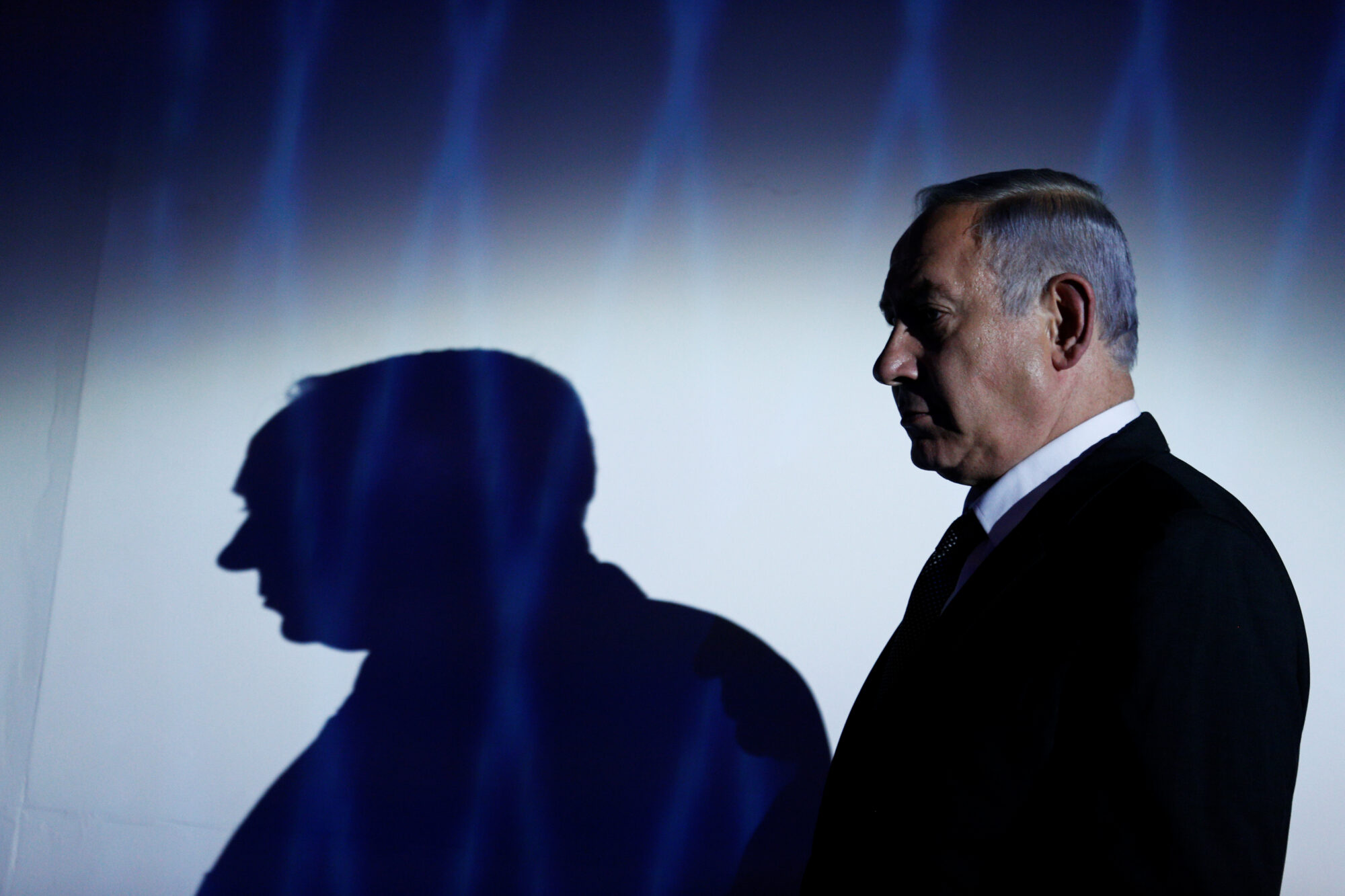When the Soviet army moved to crush a powerful pro-independence movement in its republic of Lithuania in 1991, the military’s list of targets included Lithuania’s broadcast studios and TV transmission tower, which for months had defiantly sent out news free of Soviet censorship.
The bloodiest attack came when tanks rumbled up the TV tower hill in Vilnius, capital of the then-Soviet republic. Hundreds of unarmed civilians stood ground there, using their bodies to protect the besieged republic’s most potent symbol of free speech.
Thirty years later, the TV tower hosts a small museum memorializing the 14 people who died defending the structure. And the broadcast studios, where Soviet soldiers once battered down doors to silence the calls for independence, now house the country’s public broadcaster, Lithuanian National Radio and Television (LRT).
The 30th anniversary of the Soviet army attack was widely commemorated on January 13, with videos, slide shows, and “I remember” features published throughout the public and private media that today serve Lithuania’s 2.8 million people. The independent accountability reporting they provide is a little-noticed post-Cold War success, enabled by a press freedom climate ranked higher than the U.K., France, or the U.S. The Reporters Without Borders Press Freedom Index puts Lithuania 28th out of 180 countries; of the 15 former Soviet republics, only fellow Baltic states Estonia and Latvia rate higher.
But in those broadcast studios once targeted by the Soviet military, journalists are under attack again. This time it’s not tanks, or soldiers, or even politicians leading the charge. Instead, it’s LRT’s commercial competitors, who have cried “unfair” in a formal complaint asking for a European Union order to curb the public broadcaster’s state-financed budget and online news operation.
Public funding of broadcasting is a cherished cornerstone of European democracies. Across the continent, public radio and TV enjoyed government-approved monopolies on the airwaves for decades, in exchange for fulfilling mandates like the BBC’s — to “inform, educate, and entertain.” Even after commercial competitors were allowed in the 1980s, European governments have continued to collect special fees or grant government funds for public media, citing goals of promoting civil discourse, national unity and independent, trustworthy reporting.
In the broadcast studios once targeted by the Soviet military, journalists are under attack again
But in this digital age, commercial competitors to the BBC and publicly funded outlets in Germany, Ireland, Finland, and elsewhere have demanded a European rethink, in particular challenging public media expansions in online news. Lithuania, which joined the EU in 2004, entered that debate last June, when several leading commercial media outlets filed a 46-page complaint with the EU’s executive arm, the European Commission.
Their complaint argues that the Covid pandemic has firmly underscored the need for change. Ad revenue losses of 50% or more, due to Covid economics, forced many commercial newsrooms to furlough journalists or use pay cuts or layoffs to stay afloat in 2020.
While those newsrooms tightened belts, the pandemic’s financial turmoil didn’t touch LRT or its three TV channels, three radio stations, and online news sites in Lithuanian, Russian, and English. LRT is funded by fixed percentages of personal income and excise tax revenues, a formula designed by lawmakers to provide stable annual budgets shielded from political influence. For several years, the formula has translated into ever more-generous (and pandemic-proof) annual budgets: an 11% increase in 2020 was followed by another rise of 15%, totaling around $64 million, to fund LRT this year.
“They did not have to think how to survive [the pandemic] and how, for example, to cut the wages of journalists,” says Džina Donauskaitė, director of the nonprofit Lithuanian Journalism Centre, which works with both public and private media. Instead, LRT could create new pandemic-era programming, such as educational shows for children in virus lockdown and Sunday worship services on TV, after Covid forced church closures in the very Catholic country. This year’s budget increase will help LRT open a bureau in Brussels to cover the EU, a rare foreign venture for Lithuanian media.
LRT “is having something of a golden moment” says Ruslanas Irzikevicius, who edits the English version of 15min, Lithuania’s second most widely read news portal. The public broadcaster’s director general, Monika Garbačiauskaitė-Budrienė, who came to LRT after years as editor of Lithuania’s number one portal, Delfi, “has done a fantastic job with online,” Irzikevicius notes. “Overall, maybe she’s doing too good a job,” he says. “There has to be some kind of balance.”
“Balance” is a mantra repeated frequently by commercial rivals, who warn that if LRT becomes too dominant, the relatively rich selection of journalism in this small country – from traditional broadcast news and digital-first sites to nonprofit longform storytelling and YouTube news channels – will wither away. That may be particularly alarming for those who remember the Soviet era, when there was no media competition, only the censored propaganda of the Communist Party.
Soviet Lithuania’s brief defiance of that censorship regime led to the 1991 attack on its TV tower, but less than a year later the Soviet Union collapsed. Suddenly Lithuania and the 14 other Soviet republics were independent countries, free to build new, uncensored media systems.
After decades of Soviet rule, though, there were no traditions of ethical journalism and few legitimate revenue sources. A kind of “wild capitalism” ruled Lithuania’s post-Soviet media market, says journalist Rolandas Barysas, who covered the early years of independence for Reuters. A common practice was to run “news” stories paid for by businessmen or politicians. Blackmail was another technique for raising revenues: Buy ads with us, or we’ll print something scurrilous about you.
In 2007, citing the continuing shakedown practices in some newsrooms, Politico Europe proclaimed “Lithuanian newspapers in need of a makeover.” An exception, according to Politico, was Verslo žinios, a business paper with an “impeccable reputation” that was founded with financial support from Sweden’s Bonnier media group.
Bonnier investments in Lithuania and its Baltic neighbors Latvia and Estonia brought “values, mission to serve society, objectiveness, and independence” to the region’s media, says Barysas, who became Bonnier’s partner at Verslo žinios. Barysas, who still edits the paper, says it’s been a training ground for young reporters, some of whom have gone on to become leaders in other Lithuanian newsrooms.
One of those leaders is Garbačiauskaitė-Budrienė, the current LRT director general, who was just 19 when she became a journalist in the post-Soviet era. After a few years at Verslo žinios, she joined a 2000 startup called Delfi, an internet service provider that initially offered customers more games and entertainment than news.

Over time, and eventually under Garbačiauskaitė-Budrienė’s leadership as editor in chief, Delfi revolutionized Lithuanian journalism, luring readers and advertisers online with a robust mix of news and features, updated throughout the day and, unlike its print competitors, free of charge. Delfi hastened the decline of Soviet-vintage newspapers, which were slow to build an internet presence. Of the handful of national papers that remain today, none publishes a daily print edition. And Delfi continues to lead the far more popular online market for news.
Three years ago, Garbačiauskaitė-Budrienė moved from commercial media to LRT. As leader of the public broadcaster, she moved swiftly to create an investigative reporting desk and to fend off political challenges to LRT’s independence. (A new management board proposed by populist government leaders in 2019 was not approved, nor did the same politicians succeed with a court challenge to LRT’s funding.)
Even commercial media critics say LRT’s journalism has remained strong under Garbačiauskaitė-Budrienė, who has used her budget and staff – the largest in Lithuanian media — to mount ambitious coverage of major events, such as national elections and Pope Francis’s 2018 visit to Lithuania.
But commercial rivals balked when that budget enabled LRT to win air rights for this season’s EuroLeague basketball games. In the past, the games aired behind a paywall on commercial TV3; LRT is now showing many of them for free (but selling sponsorships, similar to PBS underwriting, which further incensed commercial rivals).
“Basketball is a religion here in Lithuania,” says Delfi CEO Vytautas Benokraitis, who was Garbačiauskaitė-Budrienė’s boss when she was editor in chief at Delfi. Benokraitis, who made a losing bid for the EuroLeague season, argues that such popular, commercially lucrative programming doesn’t belong on a channel that’s funded by taxpayers. “Why should the state invest in a product that could be fully covered by a commercial player?” he asks, suggesting that LRT instead invest in more cultural programs.
That’s one of the arguments made in the commercial media complaint to the European Commission. Any decision could be years away, and any EC call for change would still require action by Lithuania’s government.
But past EC decisions have shown some sympathy for commercial media, in particular challenges to a public broadcaster’s online expansions. Many European countries now impose very specific restrictions. In the French-speaking part of Belgium, for example, the public broadcaster can only post election opinion polls online if the results have already been discussed on its radio or TV channels, while German and Austrian public media can put their sports videos online for no more than 24 hours. (Cultural programming can stay posted indefinitely.)
Such piecemeal restrictions don’t really satisfy the fundamental complaint of Lithuania’s commercial media: that the public broadcaster should focus on audio and video, using online and mobile platforms largely as a repository for that broadcast work.
From the day she arrived at LRT in 2018, though, Garbačiauskaitė-Budrienė has rejected that as an outdated view.
“We live in the 21st century, and there are no more boundaries between different media platforms,” she said in an early interview with her old employer, Verslo žinios. “Content must reach the user through the most convenient channels.”
At the time, LRT’s online presence barely registered in audience surveys. Three years on, it now regularly ranks as Lithuania’s fifth-most visited news portal – thanks to more frequent news updates, mobile push notifications, and new, digital-only content, like a documentary series that has tackled sensitive topics such as gay parenting and abortion.
Garbačiauskaitė-Budrienė sees these changes as essential, if LRT is to be relevant for younger audiences, whose preferred platforms are online and mobile. During an interview on Zoom, she holds up her cell phone to the computer camera. “The world is going in a different direction, and everything is here,” she says. “Your news is here.”
The competition for those digital audiences is fierce, and Garbačiauskaitė-Budrienė’s former newsroom, Delfi, is still winning it, with an editorial mix described by The Fix, a European media review, as “a supermarket.” Some of Delfi’s recent serious journalism included a deep-dive investigation of Russian disinformation and an expose of an elaborate fraud operation run from a Lithuanian prison. Covid updates dominate the home page, though they bump up against other features begging for clicks; on one late January day, the clickbait included horoscopes, a guide to cleaning your toilet, and an article speculating that actress Demi Moore’s new look was caused by a bad facelift.
The fight between LRT and commercial rivals makes Lithuania’s news community uncomfortable, not least because it sometimes resembles a battle of personalities more than policy
Clickbait is a common target of Delfi reader complaints, as is the vitriol posted anonymously in some comment sections. But as it celebrates its 21st anniversary this year, Delfi remains an innovator. It’s a party to the complaint against LRT, but the company managed to avoid pandemic-related staff cuts last year thanks in part to its growing online video programming and its pioneering paywall for premium content, according to company CEO Benokraitis.
Delfi’s main online rival, 15min, very publicly eliminated anonymous comments a few years ago in an “internet hygiene” campaign. 15min has also sought to distinguish itself by emphasizing political analysis and investigative reporting, like its work uncovering alleged corrupt ties between Lithuanian business conglomerate MG Baltic and prominent politicians. Several 15min journalists have left in recent months, though, in a bitter dispute over editorial direction with the top manager, chosen under the leadership of the politically conservative Estonian businessman who owns 15min’s parent company. Among those departing were the site’s top editor and the last two reporters in 15min’s investigative unit.
That loss leaves LRT as the only major newsroom with a full-time investigative staff – and with the budget to withstand legal challenges to its investigations, says Donauskaitė, the director of the Lithuanian Journalism Centre. “You have to have more resources allocated for that,” she says, noting that LRT is still in court over an investigation that exposed corrupt campaign contributions to a mayoral candidate in the seaport city of Klaipeda; the candidate lost. Such reporting poses financial risks, “and public broadcasting can afford to do that. Commercial media, not always,” says Donauskaitė.
The fight between LRT and commercial rivals makes Lithuania’s news community uncomfortable, not least because it sometimes resembles a battle of personalities more than policy – “a catfight,” as one journalist described it.
Several journalists said they wished commercial media and LRT could have found a way to discuss their differences without the formal complaint to the EC. “Our fight with the national broadcaster is really bad for our image, for all journalism,” Delfi CEO Benokraitis acknowledges.
But without a fight, he warns, Lithuania could lose the democracy and free press that it fought so hard for 30 years ago. Poland is the cautionary example that some point to, as what could happen if commercial media grows too weak. In Poland, a strong, independent public broadcaster had few commercial rivals when a populist government took office in 2015. That government has purged the public broadcaster’s professional journalists, replacing them with party loyalists who have turned the newsroom from a public service entity into a state-controlled propaganda mouthpiece, with only weak alternative media voices.
Such a scenario seems a remote possibility in Lithuania’s current political climate. National pride in its role in speeding the Soviet collapse remains high. And last October’s national elections brought to power a governing coalition that recently proclaimed, “The quality of democracy requires a strong and independent news media,” a statement welcomed by journalists.
That’s great, says Ruslanas Irzikevicius, the editor at 15min English. But “You never know what might happen in the next election.”




